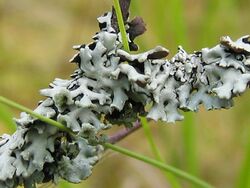Biology:Hypogymnia physodes
| Hypogymnia physodes | |
|---|---|

| |
| Scientific classification | |
| Domain: | Eukaryota |
| Kingdom: | Fungi |
| Division: | Ascomycota |
| Class: | Lecanoromycetes |
| Order: | Lecanorales |
| Family: | Parmeliaceae |
| Genus: | Hypogymnia |
| Species: | H. physodes
|
| Binomial name | |
| Hypogymnia physodes (L.) Nyl. (1896)
| |
| Synonyms | |
| |
Hypogymnia physodes, commonly known as the monk's-hood lichen, is a species of foliose lichen in the family Parmeliaceae. It is a common and widespread species in boreal and temperate forests of the Northern Hemisphere. It has a grey to yellowish-green thallus that is loosely attached to its substrate and forms large irregular patches. Hollow lobes are 2–3mm wide. The outer edge turns up and is frequently covered with white powdery soredia underneath. Its lower surface is black, wrinkled and has some browning toward the lobe margins. The pycnidia are black and abundant, and their presence creates a pepper-like effect across the upper surface.[1] Because of its abundance and its moderate sensitivity to sulphur dioxide and heavy metals, Hypogymnia physodes is often used in bioindicator and biomonitoring studies that enable the assessment of air pollution and other environmental conditions.[2][3]
References
- ↑ Brodo, Irwin M.; Sharnoff, Sylvia Duran; Sharnoff, Stephen (2001). Lichens of North America. Yale University Press. p. 354. ISBN 978-0300082494.
- ↑ Hauck, Markus; Böning, Janina; Jacob, Mascha; Dittrich, Sebastian; Feussner, Ivo; Leuschner, Christoph (2013). "Lichen substance concentrations in the lichen Hypogymnia physodes are correlated with heavy metal concentrations in the substratum". Environmental and Experimental Botany 85: 58–63. doi:10.1016/j.envexpbot.2012.08.011.
- ↑ Herzig, R.; Liebendörfer, L.; Urech, M.; Ammann, K.; Cuecheva, M.; Landolt, W. (1989). "Passive Biomonitoring with Lichens as a Part of an Integrated Biological Measuring System for Monitoring Air Pollution in Switzerland". International Journal of Environmental Analytical Chemistry 35 (1): 43–57. doi:10.1080/03067318908028377.
Wikidata ☰ Q881824 entry
 |

